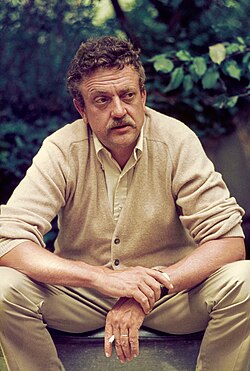Kurt Vonnegut Jr. Quote
It may be that the most striking thing about members of my literary generation in retrospect will be that we were allowed to say absolutely anything without fear of punishment. Our American heirs may find it incredible, as most foreigners do right now, that a nation would want to enforce as a law something which sounds more like a dream, which reads as follows:Congress shall make no law respecting an establishment of religion, or prohibiting the free exercise thereof, or abridging the freedom of the press, or the right of the people peaceably to assemble, and to petition the Government for a redress of grievances.How could a nation with such a law raise its children in an atmosphere of decency? It couldn't--it can't. So the law will surely be repealed soon for the sake of children.
It may be that the most striking thing about members of my literary generation in retrospect will be that we were allowed to say absolutely anything without fear of punishment. Our American heirs may find it incredible, as most foreigners do right now, that a nation would want to enforce as a law something which sounds more like a dream, which reads as follows:Congress shall make no law respecting an establishment of religion, or prohibiting the free exercise thereof, or abridging the freedom of the press, or the right of the people peaceably to assemble, and to petition the Government for a redress of grievances.How could a nation with such a law raise its children in an atmosphere of decency? It couldn't--it can't. So the law will surely be repealed soon for the sake of children.
Related Quotes
With school turning out more runners, jumpers, racers, tinkerers, grabbers, snatchers, fliers and swimmers instead of examiners, critics, knowers and imaginative creators, the word 'intellectual' of c...
There is coming a day, when freedom will just be a essence of the mind, an inner dwelling that was once physically attainable. They will tell you where you can live, and what you can wear and drive, w...
An advanced human rights friendly Constitution is fine and well - but what good is it if it is not put into practice? The government says it cherishes the principles in the SA Constitution, and yet ac...
About Kurt Vonnegut Jr.
Born and raised in Indianapolis, Vonnegut attended Cornell University, but withdrew in January 1943 and enlisted in the U.S. Army. As part of his training, he studied mechanical engineering at the Carnegie Institute of Technology and the University of Tennessee. He was then deployed to Europe to fight in World War II and was captured by the Germans during the Battle of the Bulge. He was interned in Dresden, where he survived the Allied bombing of the city in a meat locker of the slaughterhouse where he was imprisoned. After the war, he married Jane Marie Cox. He and his wife both attended the University of Chicago while he worked as a night reporter for the City News Bureau.
Vonnegut published his first novel, Player Piano, in 1952. It received positive reviews yet sold poorly. In the nearly 20 years that followed, several well regarded novels were published, including The Sirens of Titan (1959) and Cat's Cradle (1963), both of which were nominated for the Hugo Award for best science fiction or fantasy novel of the year. His short-story collection, Welcome to the Monkey House, was published in 1968.
Vonnegut's breakthrough was his commercially and critically successful sixth novel, Slaughterhouse-Five (1969). Its anti-war sentiment resonated with its readers amid the Vietnam War, and its reviews were generally positive. It rose to the top of The New York Times Best Seller list and made Vonnegut famous. Later in his career, Vonnegut published autobiographical essays and short-story collections such as Fates Worse Than Death (1991) and A Man Without a Country (2005). He has been hailed for his darkly humorous commentary on American society. His son Mark published a compilation of his work, Armageddon in Retrospect, in 2008. In 2017, Seven Stories Press published Complete Stories, a collection of Vonnegut's short fiction.
